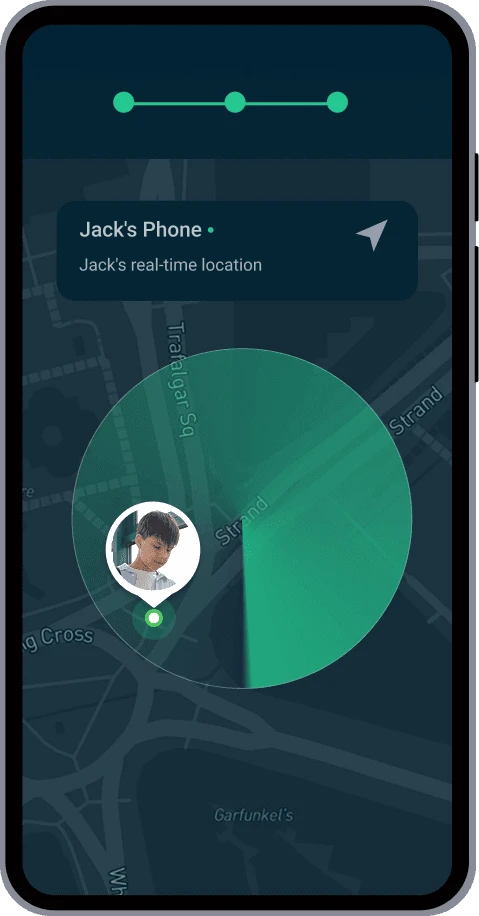양육이 변했습니다. 당신의 도구도 그래야 합니다.
오늘날 아이를 키우는 것은 그들이 어디로 가는지를 지켜보는 것 이상입니다. 그들이 디지털에서 어디에 있는지를 이해하는 것입니다. 심야 채팅부터 소셜 앱의 낯선 사람들까지, 아이들은 종종 이야기하지 않는 위험에 직면합니다. 부모로서 당신은 염탐할 필요가 없습니다. 당신은 단지 알아야 합니다.

그들이 누구와 이야기하고 어떻게 소통하는지 이해하기
당신의 자녀의 통화, 문자 및 채팅을 주의 깊게 살펴보아 그들이 누구와 연결되고 어떻게 소통하는지를 이해하세요. 이를 통해 당신은 정보를 얻고 그들을 안전하게 안내할 수 있습니다.

그들의 디지털 발자국을 보고 더 안전한 습관을 안내하기
당신의 자녀가 저장하고, 탐색하고, 검색하는 것을 보아 그들의 디지털 세계를 더 잘 이해하고, 더 안전하고 건강한 온라인 습관을 기르는 데 도움을 주세요.

가장 중요한 순간에 실시간으로 함께하기
보고서와 기록을 넘어, 가장 중요한 순간에 그들의 화면을 보고, 주변 소리를 듣고, 카메라를 실시간으로 켜서 진정한 마음의 평화를 제공합니다.

경계를 설정하고 디지털 위험이 발생하기 전에 예방하기
모니터링을 넘어, VigilKids는 당신의 자녀를 위한 균형 잡힌 안전한 디지털 경험을 만들기 위해 더 스마트한 제어 및 추가 기능을 제공합니다.
3단계로 시작하기

VigilKids 기술 사양
대상 장치:
대상 장치 안드로이드:
삼성, 화웨이, OPPO, 샤오미, 비보, 구글, LG 등 5000개 이상의 주요 안드로이드 브랜드를 지원합니다.
지원되는 버전:
안드로이드 6.0부터 14까지 자녀의 전화에 설치가 필요합니다.
부모 장치:
모든 장치 및 플랫폼:
VigilKids의 안전한 웹 기반 제어판을 사용하여 모든 장치, 전화, 태블릿 또는 컴퓨터에서 자녀의 활동을 모니터링합니다.
왜 우리가 VigilKids를 만들었는가
VigilKids: 신뢰와 보호
현대의 육아는 쉽지 않습니다. 우리는 그걸 압니다—왜냐하면 우리도 그곳에 있었으니까요. 우리는 신뢰와 보호 사이의 간극을 메우기 위해 VigilKids를 만들었습니다. 우리의 목표는 결코 통제하는 것이 아니라, 당신이 자녀의 디지털 여정을 방해하지 않고 안내할 수 있도록 힘을 주는 것이었습니다. 당신이 엄마, 아빠, 조부모, 또는 보호자이든—VigilKids는 대립 없이 명확성을 제공합니다.
더 스마트하고, 더 안전하며, 더 완벽한 부모 통제 솔루션
출시 이후, VigilKids는 전 세계 가족들에게 신뢰받는 파트너가 되었습니다. 안전과 균형을 염두에 두고 설계되어, 부모가 자녀의 디지털 생활에 대해 불필요한 간섭 없이 정보를 유지할 수 있도록 합니다. 고급 AI 기반 모니터링 및 실시간 접근 기능을 통해, VigilKids는 현대 부모 통제를 재정의하고 있습니다.

보호된 가족들
전 세계 부모들이 VigilKids를 신뢰하여 아이들을 온라인에서 안전하게 지킵니다

안전하게 모니터링된 대화
WhatsApp, SMS 및 통화가 개인 정보를 염두에 두고 추적됩니다

위험 경고 전달됨
민감한 단어, 유해한 콘텐츠 및 의심스러운 활동이 감지되었습니다

항상 켜져있고 항상 배려합니다
안심을 위한 24시간 디지털 보호
만족한 VigilKids 고객의 리뷰
Catherine L., 15세 아들의 엄마
나는 아들을 통제하려고 한 것이 아니라—그가 겪고 있는 일을 이해하고 싶었습니다. VigilKids는 그가 이야기하기 두려워했던 늦은 밤 메시지를 볼 수 있도록 도와주었습니다.
Monica D., 혼합 가족의 엄마
나는 심각한 것을 발견할 것이라고 예상하지 않았지만, 화면 녹화는 메시지보다 훨씬 더 많은 것을 드러냈습니다. 그것은 내가 솔직한 대화를 나누는 데 필요한 명확성을 주었습니다.
Rachel S., 걱정하는 부모
위치 추적이 나의 불안을 많이 덜어주었습니다. 이제 그녀가 안전하게 집에 도착했는지 매시간 전화할 필요가 없습니다.
Mark J., 장거리 파트너
나는 다른 모니터링 도구를 사용해 보았지만, 대부분은 너무 뻔하거나 너무 기술적이었습니다. VigilKids는 그냥 작동합니다—그리고 보이지 않습니다.
Angela P., 싱글 맘
삭제된 WhatsApp 채팅을 보는 것은 내가 다른 방법으로는 얻을 수 없었던 답을 주었습니다. 그것은 내가 더 명확한 조건으로 신뢰를 재구축하는 데 도움을 주었습니다.
Lisa & Eric, 중학생의 부모
우리 딸이 괴롭힘을 당할 때 사용했고, 학교에 가져갈 수 있는 증거를 제공했습니다. 그것은 염탐이 아니라 그녀를 보호하는 것이었습니다.
Monica D., 혼합 가족의 엄마
계모로서 나는 중요한 것을 놓치고 싶지 않았습니다. VigilKids는 경계를 넘지 않고도 내가 참여할 수 있도록 도와주었습니다.
Rachel S., 걱정하는 부모
나는 VigilKids가 보여주기 전까지 시크릿 브라우저에서 무슨 일이 일어나고 있는지조차 몰랐습니다. 내가 개입할 수 있을 만큼 일찍 그것을 보게 되어 기쁩니다.










